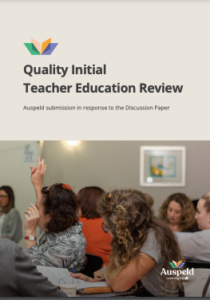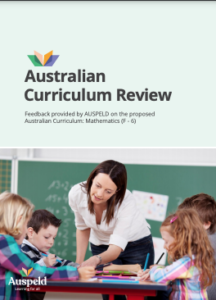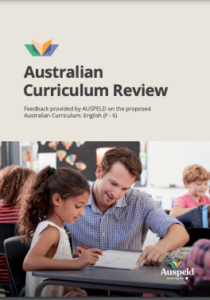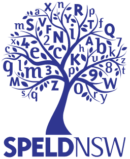 Auspeld Quality Initial Teacher Education Review
Auspeld Quality Initial Teacher Education Review
Auspeld recently provided a response to the Quality Initial Teacher Education Review Discussion Paper. Auspeld’s submission considered the key questions of how best to attract and select high-quality candidates into the teaching profession, and how best to prepare Initial Teacher Education (ITE) students to be effective teachers.
“Well-trained and knowledgeable teachers have the potential to significantly change the academic outcomes achieved by students and to reduce the gap between those making progress and those who are not. Teachers are our most powerful agent for change, and it is essential that they receive the pre-service training and the in-school support and mentoring they need to succeed.”
Auspeld Curriculum Review
As part of the recent Review of the Australian Curriculum, Auspeld prepared two separate submissions outlining a number of issues of concern with the proposed draft curriculum. Auspeld’s submissions provided specific feedback regarding the Australian Curriculum English (F-6) and Mathematics (F-6).
 The Math submission has been prepared by AUSPELD, the Australian Federation of SPELD Associations, to provide feedback on the proposed revisions to the Australian Curriculum: Math (F-6). AUSPELD represents tens of thousands of teachers, allied health professionals and families; all of whom are strongly committed to the introduction of a more evidence- informed curriculum that has at its heart – increased access, higher aspirations, and improved outcomes for all students – including those at greatest risk.
The Math submission has been prepared by AUSPELD, the Australian Federation of SPELD Associations, to provide feedback on the proposed revisions to the Australian Curriculum: Math (F-6). AUSPELD represents tens of thousands of teachers, allied health professionals and families; all of whom are strongly committed to the introduction of a more evidence- informed curriculum that has at its heart – increased access, higher aspirations, and improved outcomes for all students – including those at greatest risk.
 The English Submission focuses on seven overriding issues of concern. These include:
The English Submission focuses on seven overriding issues of concern. These include:
- Ambiguity across the strands of language, literature and literacy
- Poor language choices for the descriptors
- Low aspirations and expectations across all year levels
- The continued inclusion of ineffective reading, spelling and writing strategies
- The lack of emphasis on the development of oral language in the early years
- Little attention given to handwriting instruction in contrast to a significant focus on technology
- Frequent irregularities between substrands, content descriptions and elaborations




